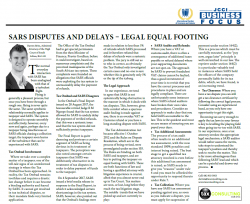Darren Britz - SARS Disputes And Delays2017-11-28 The normal everyday interaction with SARS has been analogised with that of a turbulent flight.
Flying is generally a pleasant process, but once you have been through a rough one, flying is never quite the same. The same symbiotic relationship normally applies to taxpayer and SARS. The system is designed to operate smoothly and effectively, however, every now and again, perhaps due to a taxpayer being mischievous or SARS officials chasing a collection target, the taxpayer soon learns of the turbulence that can be experienced with SARS. Tax Ombud Involvement Where we take over a complex matter of a taxpayer, one of the tell-tale signs of an uninformed strategy is where the Tax Ombud has been approached. In reality, the Tax Ombud remains toothless and requires a drastic law change before it can become a binding authority and feared by SARS. It cannot get involved in tax technical disputes, so their mandate finds very limited application. The Office of the Tax Ombud had to get special permission from the then Minister of Finance, Pravin Gordhan, before it could investigate, based on numerous complaints and the perceived inadequacies of the South African tax system. These complaints were founded on allegations that SARS officials were exploiting the tax system to unreasonably delay the payment of refunds. Tax Ombud and SARS Disagrees In the Ombud’s Final Report issued on 28 August 2017, the honourable retired Judge B M Ngoepe found that the tax system allowed for SARS to unduly delay the payment of verified refunds, that this was a systemic issue and that the tax system did not sufficiently protect taxpayers. The Final Report is quite damning and portrays a certain segment of SARS as being devious in its treatment of taxpayers. The perception was also noted amongst certain taxpayers that SARS was deliberately obstructive in its treatment of tax disputes in order to delay payment of funds to the taxpayer. On 4 September 2017, SARS issued a brief media release in response to the Final Report, in which it acknowledged certain shortcomings in the tax system. SARS, however, also pointed out that the Ombud’s findings were made in relation to less than 1% of refunds which SARS processed and it therefore refuted that delays of refunds were a systemic problem. The jury is still out as to who is correct, as obviously the Tax Ombud only investigated certain cases and no-one is sure whether this is genuinely only 1% or the tip of the iceberg. The Legal Approach In our experience, we tend to agree that SARS is not systemically being obstructive in the manner in which it deals with tax disputes. This, however, gives little comfort when a spurious audit finding is made against you, there is an overdue VAT or Customs refund or you have a long-standing dispute with SARS. The Tax Administration Act became effective 1 October 2012 and the Rules on Dispute Resolution, which are in the process of being revised, were promulgated under section 103. The Rules are binding on both SARS and taxpayer, and are key to putting the taxpayer on equal footing with SARS. These are both functions of law and having a qualified attorney with litigation experience is crucial, albeit that you almost never end up in Tax Court. Tax matters are won, or lost, long before they reach the tax litigation stage. The notable trends that we have picked up and are currently in play:
darren@taxconsulting.co.za www.taxconsulting.co.za |
Darren Britz - SARS Disputes And Delays
Copyright © 2026 KwaZulu-Natal Top Business
